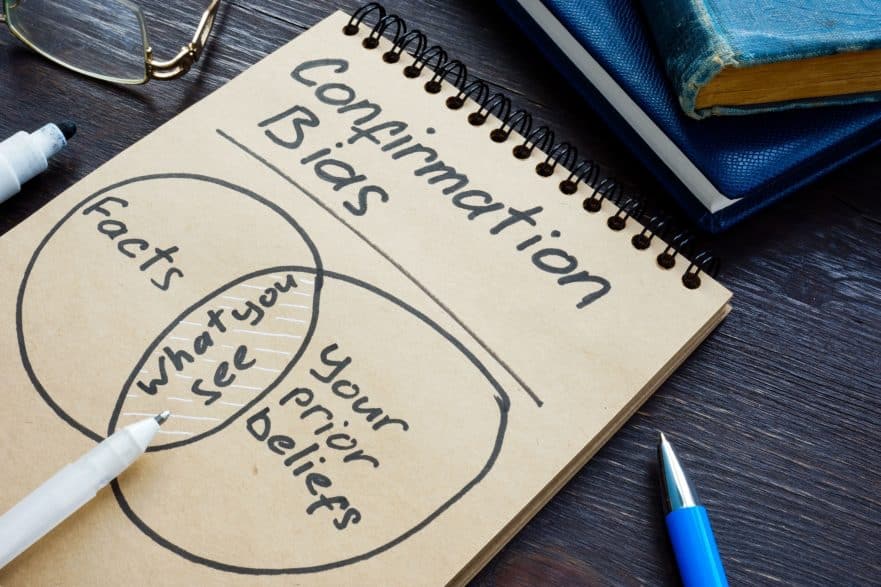The idea of confirmation bias gets a lot of attention these days, but there’s not much discussion about the ways it can impact our mental health.
Confirmation bias is the unconscious inclination to seek, interpret, and remember information that confirms our pre-existing beliefs.
In many ways, it’s a self-reinforcing mental loop that keeps you seeing what you want to see.
Daniel Kahneman, the author of Thinking, Fast and Slow, puts it this way: “Confirmation bias comes from when you have an interpretation, and you adopt it, and then, top down, you force everything to fit that interpretation.”
Let’s say you think your supervisor at work dislikes you. Every time you interact, you’re sure you see signs that this is true: You read every expression on their face as hostility, or hear a disparaging tone in their voice when they talk to you. Even their acts of kindness seem to you motivated by malice.
The world has a funny way of conforming to our preexisting beliefs. Become aware of the negative and limited beliefs that you hold and which may be narrowing down your visions.
Impact of Confirmation Bias
When our beliefs about certain situations or individuals are negative, confirmation bias can have harmful consequences. It can lead to troubled relationships and conflict, or cause you to avoid situations or people that, in reality, might be good for you. These things can affect our mental health.
For example, say you believe that bad things always happen to you or that you’re unlucky. Confirmation bias will keep you fixated on the adverse events in your life while overlooking the positive.
Such persistent negative thinking affect your mental health and happiness in major ways. Negative self-talk can put you at higher risk for depression, anxiety, feelings of low self-worth among others.
These feelings keep you from living in alignment with what brings you joy, fulfillment and peace.
Breaking free of confirmation bias and leaning into a more objective view can stop the cycle of negative self-talk and open your eyes to opportunities and possibilities that seemed unreachable until then.
Looking For Therapy?
Start Healing Today.
212-960-8626
Strategies to Break Free of Confirmation Bias
Eliminating or reducing confirmation bias isn’t easy. It requires you to remain conscious of the possibility that certain of your beliefs and perceptions may be wrong. This can be deeply uncomfortable. But if you push through this discomfort, you can reduce the bias.
Try these strategies to break free from confirmation bias:
- Question your limited beliefs and assumptions
When you notice a negative belief or assumption, such as “good things don’t happen to me” hit the pause button.
- Do your research
If you’re not sure whether you’re perceiving a situation correctly, dare to research an alternate viewpoint. Use varied, reputable sources that aren’t your usual go-to’s. And consider how well you’ve researched your initial position. Are you sure you have fair, accurate, and current information? Could there be some truth to one or more different perspectives?
- Accept the discomfort
The human brain doesn’t like mental discomfort and will throw up all kinds of barriers to avoid it. Learn to sit with discomfort as you consider other viewpoint by reminding yourself that it’s an experiment—not a commitment.
- Seek insight from a psychotherapist
A therapist can be an insightful, judgment-free sounding board as you explore and challenge self-limiting beliefs.
Strategies to Break Free of Confirmation Bias
Eliminating or reducing confirmation bias isn’t easy. It requires you to remain conscious of the possibility that certain of your beliefs and perceptions may be wrong. This can be deeply uncomfortable. But if you push through this discomfort, you can reduce the bias.
Try these strategies to break free from confirmation bias:
A. Question your limited beliefs and assumptions
When you notice a negative belief or assumption, such as “good things don’t happen to me” hit the pause button.
Ask yourself:
Is there another way of looking at the situation?
Is this belief an absolute truth or can it be limited somehow?
Visualize zooming out from this situation, what do I see now?
What evidence is there for this alternative view?
Is there a way to reconcile and integrate all these different perspectives?
B. Do your research
If you’re not sure whether you’re perceiving a situation correctly, dare to research an alternate viewpoint. Use varied, reputable sources that aren’t your usual go-to’s. And consider how well you’ve researched your initial position. Are you sure you have fair, accurate, and current information? Could there be some truth to one or more different perspectives?
C. Accept the discomfort
The human brain doesn’t like mental discomfort and will throw up all kinds of barriers to avoid it. Learn to sit with discomfort as you consider other viewpoint by reminding yourself that it’s an experiment—not a commitment.
Think of embracing other viewpoints as an enriching experience. Looking a the same thing from a variety of ventage point, the thing reveals different aspect of itself. Yet it is the same thing.
D. Seek insight from a psychotherapist
A therapist can be an insightful, judgment-free sounding board as you explore and challenge self-limiting beliefs.
They can help you uncover patterns of negative perception and adopt new, more objective modes of seeing the events and people in your life.
Final Considerations
No one is free of confirmation bias. We all have the instinct to stay in the safe and easy zone of the familiar, right or wrong.
But clinging to beliefs that stand in the way of your progress can take a toll on your mental health.
“The first principle is that you must not fool yourself—and you are the easiest person to fool” Richard Feynman observed.
Your mind will almost certainly resist at first. But exploring why you hold on to limiting views and learning how to reframe your perceptions can help you live the life you want.
We Can Help
If confirmation bias prevents you from growing into your best self, talk to an experienced therapist. At Manhattan Mental Health Counseling, we offer easy, affordable, and high-quality therapy in person and online. Contact us today to be matched with a therapist.

